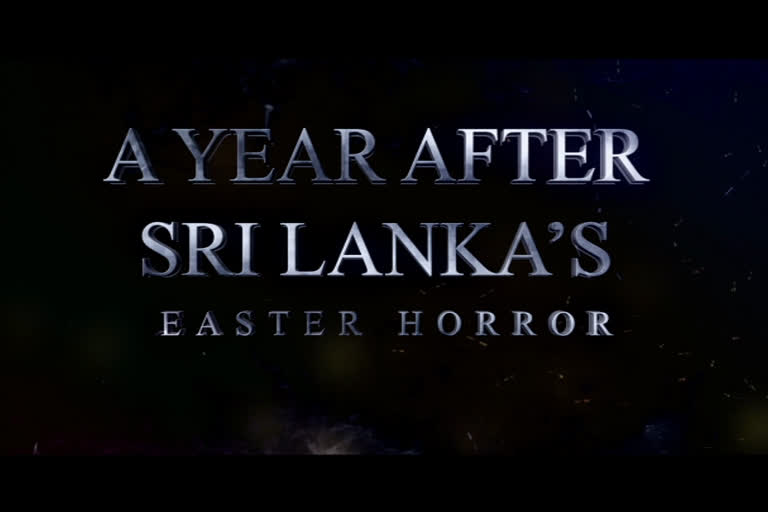Hyderabad: A somber year has passed since the gruesome attacks on the island nation leaving a mass of unanswered questions. Just a day before Sri Lanka was bracing to commemorate a year of its tragedy, police spokesman SP Jaliya Senaratne informed that the perpetrators were planning a second attack in the country.
The Criminal Investigation Department (CID), which has been probing the attack for the last one year went further to add: "It has been revealed that these suspects who were arrested (recently) have worked with certain organisations to preach extremism, misleading youth by giving them a wrong interpretation of Islam.”
Yet in many ways the attacks on the Easter Sunday last year have been one of the almost open and shut case: More than 259 innocents were killed including 45 foreign nationals (11 Indians) and three police officers, and at least 500 were injured in a spate of bombings and property worth crores turned into ashes in a matter of few hours.
A year after where does the investigation lead us to? There have hardly been any breakthroughs all these months till last Wednesday when the Sri Lankan police made two high-profile arrests: one a prominent lawyer and other a Muslim political party leader's brother who allegedly had links with one of the suicide bombers.
Read Also: Easter Sunday bombers planned second attack in Sri Lanka: Police
Nine suicide bombers affiliated to local Islamist extremist group National Thowheed Jamath (NTJ) blasted three churches and three luxury hotels on April 21, 2019. The NTJ is a jihadist group affiliated to the Islamic State. The government of the day banned the NTJ soon after the blasts.
The deadly explosions targeted Christians at 'Easter Sunday' church services in Colombo, Negombo and Batticaloa as well as the tourists staying in luxury hotels in Colombo.
Christians in Sri Lanka celebrated Easter in their homes on Sunday, participating in religious services via television as churches remained closed due to the coronavirus pandemic.
Read Also: Harry and Meghan say they won't cooperate with UK tabloids
TV stations aired the Easter Vigil and Holy Mass in all three main languages used in the Indian Ocean island nation. But there were no organized events to remember the more than 259 people, mostly Catholics, who were killed in Islamic State group-inspired bomb attacks on three churches and three hotels in Sri Lanka last Easter.
EASTER HORROR
The suicide bombers affiliated to local Islamist extremist group National Thowheed Jamath blasted three churches and three luxury hotels on April 21, 2019, killing at least 259 innocent souls including 45 foreign nationals and injuring about 500.
The explosions targeted Christians at Easter Sunday church services in Colombo, Negombo and Batticaloa and tourists staying in luxury hotels in the capital.
These coordinated bombings ripped apart St. Sebastian’s Church in Negombo, St. Anthony's Shrine in Kotahena and the evangelical Zion Church in Batticaloa.
Though the Islamic State claimed the attacks, the government blamed local Islamist extremist group National Thawheed Jamaath for the destructive bombings.
AFTERMATH:
The Sri Lankan government closed facilities for security after the attacks.
A state of emergency was clamped in the country to help the authorities with investigations. The laws helped arrests and searches without warrants. However, after four months of operations, the law came to be lifted on August 22.
The then Minister of Education Akila Viraj Kariyawasam had all schools closed for the next two days.
Former president Maithripala Sirisena appointed a presidential commission to investigate the bombings. President Gotabaya Rajapaksa also appointed a committee to undertake a formal inquiry and promised to give justice to victims.
Besides, Sirisena banned any type of face covering to prevent facial identification including the burqa or niqāb under an emergency law.
It was mandated that copies of all sermons given inside mosques be submitted to the Ministry of Muslim Religious and Cultural Affairs, as part of a broader strategic plan to monitor activities inside mosques. Further, the ministry said mosques must not be used for radicalising congregations.
After the bombings, the general public and religious leaders blamed politicians and government officials for failing to act on intelligence about the attacks.
IMPACT:
The attacks caused a stir in the country's politics and led to the sacking of the then-police chief and the then top bureaucrat at the defence ministry who were charged with negligence. Reportedly, they had failed to prevent attacks despite prior intelligence.
President Sirisena promised major changes to the leadership of the security forces within the next 24 hours and pledged a complete restructure of the police and national security forces in the coming weeks.
The deadly incident marked a turning point for the government and other political parties just before the 2019 Sri Lankan presidential election.
Following the attack, the government called for the swift enactment of the proposed Counter-Terrorism Act, replacing the existing Prevention of Terrorism Act.
The Ministry for Muslim Religious and Cultural Affairs has proposed the Madrasa Education Regulatory Act to establish a Board under the Ministry. This act was meant for regulation, registration, supervision, control and development of education within Madrasas in Sri Lanka.
The attacks left the island's tourism sector devastated. Tour operators cancelled bookings due to security fears and the government was forced to offer any concessions for its revival. Despite huge socio and economic implications, the one question every Sri Lankan asks today is: Could we be ‘safe’ hereafter? The answer cannot be a clear affirmative hereupon.



